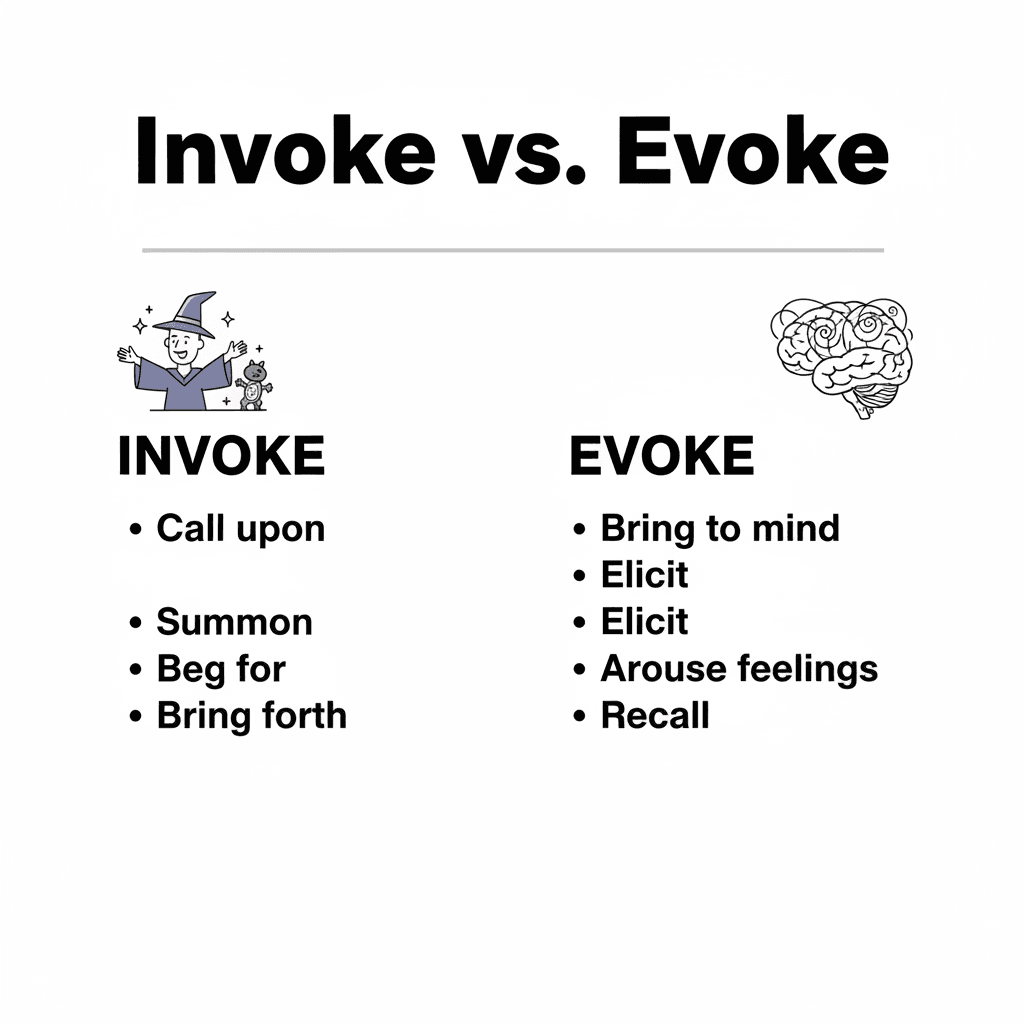Invoke vs. Evoke: What’s the Difference?
 Although invoke and evoke look similar, their meanings are very different.
Although invoke and evoke look similar, their meanings are very different.
Invoke → ✔ to call upon, request, or cite Evoke → ✔ to bring a feeling, memory, or image to mind
They are not interchangeable.
1. Invoke
Meaning
Invoke means to call upon a rule, law, authority, higher power, or principle.
It can also mean to request help or bring something into effect.
Use invoke when someone is appealing to or activating something.
Examples (10 total)
- The lawyer invoked the right to remain silent.
- She invoked the company policy during the meeting.
- The ritual was meant to invoke protection.
- He invoked his authority to make the final decision.
- The president invoked emergency powers.
- They invoked the memory of past heroes.
- The professor invoked several studies to support her point.
- He invoked the law to stop the action.
- The team invoked tradition for the ceremony.
- The witness invoked their privilege against self-incrimination.
🧠 Tip:
If someone is calling upon authority or power, use invoke.
2. Evoke
Meaning
Evoke means to bring to mind a memory, emotion, image, or reaction.
It’s often used in art, writing, music, and emotional contexts.
Use evoke when something creates a feeling or reminds you of something.
Examples (10 total)
- The smell of cookies evoked memories of childhood.
- The painting evokes a sense of peace.
- His speech evoked strong emotions from the audience.
- The song evokes nostalgia.
- The movie evoked laughter and tears.
- The scene evoked images of old New York.
- Her writing evokes vivid imagery.
- The perfume evokes memories of summer.
- The photograph evoked sadness.
- The story evokes a deep sense of longing.
🧠 Tip:
If it’s about feelings, memories, images, or emotions, choose evoke.
3. Quick Comparison Table
| Word | Meaning | Used For | Example |
|---|---|---|---|
| Invoke | call upon, cite, activate | laws, power, rules, authority | invoke the law |
| Evoke | bring to mind | emotions, memories, imagery | evoke a memory |
4. How to Remember
👉 Invoke = Initiate (call something into action)
👉 Evoke = Emotion (bring feelings or memories out)
Memory trick:
If you’re referring to power, rules, rights, authority → invoke
If you’re referring to feelings, images, memories → evoke
5. Common Mistakes
❌ Using “evoke” when citing laws
✔ Use invoke
❌ Writing “invoke emotions”
✔ Correct: evoke emotions
❌ Thinking they are synonyms
✔ They express completely different ideas
Writing More Naturally
Confusing invoke and evoke can make your writing sound unclear. If you want smoother, more precise phrasing, an AI humanizer can refine your wording and ensure you're choosing the right term every time.
FAQs
1. Can “invoke” and “evoke” be used interchangeably?
No — they have different meanings.
2. Which word relates to emotions?
Evoke.
3. Which word relates to power, laws, or authority?
Invoke.
4. Can “evoke” refer to images or memories?
Yes — it’s commonly used for sensory or emotional reactions.
Practice: Choose the Correct Word (“Invoke” or “Evoke”)
(Answers are at the end.)
- The smell of rain __________ memories of childhood.
- The judge __________ a specific law in the ruling.
- The painting __________ a feeling of calm.
- She __________ her right to remain silent.
- His words __________ strong emotions.
- The leader __________ emergency powers.
- The song __________ images of the past.
- The lawyer __________ several court cases as evidence.
- The movie trailer __________ excitement.
- They __________ tradition during the ceremony.
Answers
- evoked
- invoked
- evokes
- invoked
- evoked
- invoked
- evokes
- invoked
- evokes
- invoked
